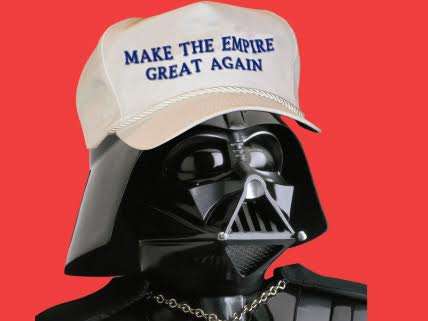How Does It Feel To Work 'Outside the Familiar Binaries of the Two-Party System'? Great!
Ain't no party like a third party. Except for a fourth, fifth, or even sixth party.

Shortly before this week's Trumpocalypse actually came to pass, Jonah Goldberg of National Review laid out his reasons for why he would never vote for the billionaire developer. You can probably guess the reasons, which are solid enough, and you can read them at length here (though I disagree with him on many things, Goldberg is always a good read, too). Toward the end of his piece, he admitted to some anxiety at severing himself from the Republican Party, at least this time around and with regards to the top of the ticket.
"If Trump is the nominee or the president," he splained, "I will for the first time be working outside the familiar binaries of the two-party system. I guess I should ask the guys at Reason magazine or Cato how they cope."
In a new Daily Beast column, I engage that question while taking a tour through other pro-third-party statements from libertarian legal genius Randy Barnett, former Politico head Jim Vandehei, and the "great unwashed rock god" Andrew W.K., among others. And after admitting to my one major-party vote—like about 40 percent of America, I fell for Walter Mondale's low-wattage Norwegian charisma in 1984, the first presidential election I voted in—I think I bring some warm comfort to Goldberg. Since that mistake, I've pulled the lever, tapped the screen, or punched the hole for the Libertarian Party's candidate.
I expect to be voting LP again come November, but that could change. If not this year, maybe down the road. I don't expect my vote to really count, I use it to express my feelings (cue the music, maestro):
I'm open to voting for a major-party candidate the minute either offers up either a person or a platform that comes close to conforming to my beliefs in "free minds and free markets" and social liberalism and fiscal conservatism. But until then, I'll "cope" being outside the "familiar binaries of the two-party system" the best way I know how: By trying to change it, so that either we have more parties that allow more of us to express ourselves by voting for policies and people we actually believe in, or shrinking politics to a smaller and smaller part of our lives so that we have more time to enjoy all the different flavors of Astroglide and deodorant and Ben & Jerry's that are out there waiting for us to sample.
There ain't no party like a third party. Except for a fourth, fifth, or even sixth party. No apologies—much less coping—necessary.


Show Comments (110)